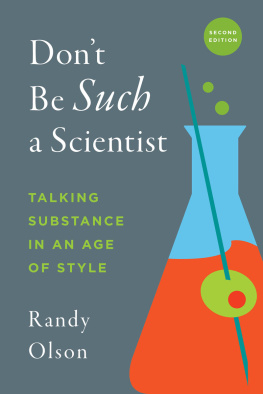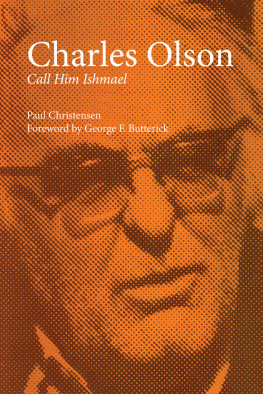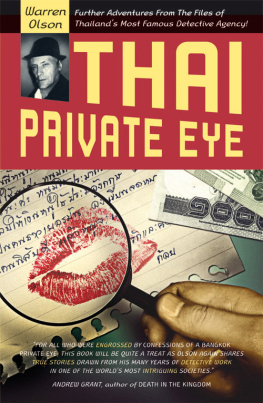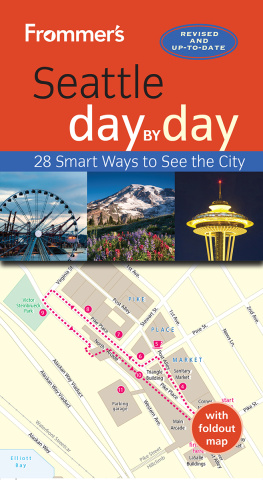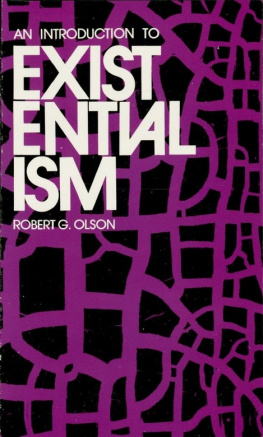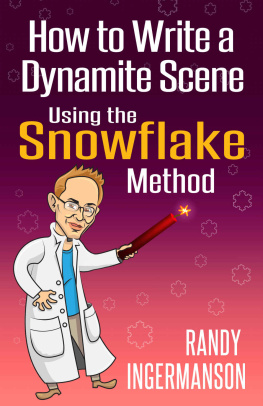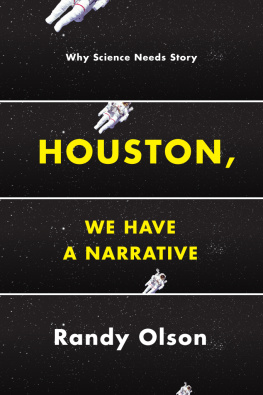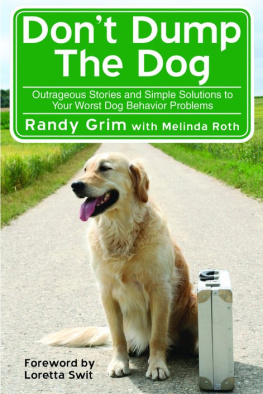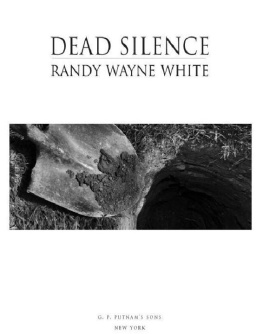Dr. Randy Olson - Dont Be Such a Scientist
Here you can read online Dr. Randy Olson - Dont Be Such a Scientist full text of the book (entire story) in english for free. Download pdf and epub, get meaning, cover and reviews about this ebook. year: 2018, publisher: Island Press, genre: Detective and thriller. Description of the work, (preface) as well as reviews are available. Best literature library LitArk.com created for fans of good reading and offers a wide selection of genres:
Romance novel
Science fiction
Adventure
Detective
Science
History
Home and family
Prose
Art
Politics
Computer
Non-fiction
Religion
Business
Children
Humor
Choose a favorite category and find really read worthwhile books. Enjoy immersion in the world of imagination, feel the emotions of the characters or learn something new for yourself, make an fascinating discovery.
- Book:Dont Be Such a Scientist
- Author:
- Publisher:Island Press
- Genre:
- Year:2018
- Rating:3 / 5
- Favourites:Add to favourites
- Your mark:
- 60
- 1
- 2
- 3
- 4
- 5
Dont Be Such a Scientist: summary, description and annotation
We offer to read an annotation, description, summary or preface (depends on what the author of the book "Dont Be Such a Scientist" wrote himself). If you haven't found the necessary information about the book — write in the comments, we will try to find it.
Dont Be Such a Scientist — read online for free the complete book (whole text) full work
Below is the text of the book, divided by pages. System saving the place of the last page read, allows you to conveniently read the book "Dont Be Such a Scientist" online for free, without having to search again every time where you left off. Put a bookmark, and you can go to the page where you finished reading at any time.
Font size:
Interval:
Bookmark:
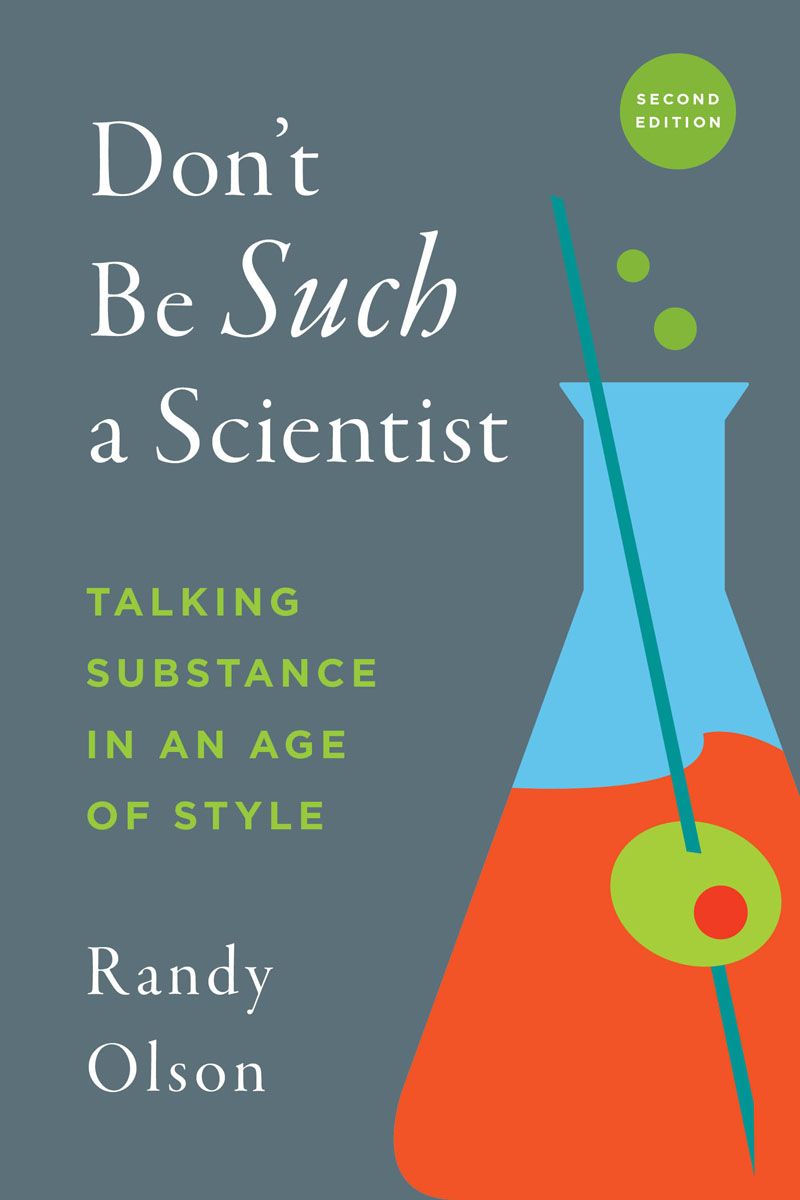
About Island Press
Since 1984, the nonprofit organization Island Press has been stimulating, shaping, and communicating ideas that are essential for solving environmental problems worldwide. With more than 1,000 titles in print and some 30 new releases each year, we are the nations leading publisher on environmental issues. We identify innovative thinkers and emerging trends in the environmental field. We work with world-renowned experts and authors to develop cross-disciplinary solutions to environmental challenges.
Island Press designs and executes educational campaigns, in conjunction with our authors, to communicate their critical messages in print, in person, and online using the latest technologies, innovative programs, and the media. Our goal is to reach targeted audiencesscientists, policy makers, environmental advocates, urban planners, the media, and concerned citizenswith information that can be used to create the framework for long-term ecological health and human well-being.
Island Press gratefully acknowledges major support from The Bobolink Foundation, Caldera Foundation, The Curtis and Edith Munson Foundation, The Forrest C. and Frances H. Lattner Foundation, The JPB Foundation, The Kresge Foundation, The Summit Charitable Foundation, Inc., and many other generous organizations and individuals.
The opinions expressed in this book are those of the author(s) and do not necessarily reflect the views of our supporters.

Island Press mission is to provide the best ideas and information to those seeking to understand and protect the environment and create solutions to its complex problems. Click here to get our newsletter for the latest news on authors, events, and free book giveaways. Get our app for Android and iOS .

Copyright 2018 Randy Olson
All rights reserved under International and Pan-American Copyright Conventions. No part of this book may be reproduced in any form or by any means without permission in writing from the publisher: Island Press, 2000 M Street, NW, Suite 650, Washington, DC 20036.
ISLAND PRESS is a trademark of the Center for Resource Economics.
Library of Congress Control Number: 2017958880
All Island Press books are printed on environmentally responsible materials.
Manufactured in the United States of America
10 9 8 7 6 5 4 3 2 1
Keywords: An Inconvenient Truth, anti-science movement, academia, climate change denial, Michael Crichton, documentary, evolution, film, Flock of Dodos, Al Gore, Hollywood, improv, listening, Carl Sagan, science communication, messaging, narrative, National Academy of Sciences, scientists, Story Circles, storytelling
This second edition is dedicated to my mother, Muffy Moose, who always said, You gotta shake em up!
You think too much! You motherf***ing think too much! Youre nothing but an arrogant, pointy-headed intellectualI want you out of my classroom and off the premises in five minutes or Im calling the police and having you arrested for trespassing. And Im not f***ing joking, you a**hole.
Well. That was the opening to the introduction of the first edition of this book.
Its been nine years since it came out, and twenty-three years since the crazy acting teacher (as Ive affectionately come to call her over the years) screamed those words at me. Ive had a lot of time to process what she meant. One thing is certainits still the most important moment of my entire professional life.
I was an innocent thirty-eight-year-old aspiring filmmaker who had just resigned from my tenured professorship of marine biology at the University of New Hampshire. I had moved to Hollywood and entered her class on the advice of a Hollywood veteran. But I wasnt ready for what happened. When I look back todaynow in my sixtiesthere is before CAT (crazy acting teacher) and after CAT. Its that simple.
I will always hate her for what she did to me. She singled me out. It was the very first night of the two-year program. She had warned us we were not allowed to ask questions in classonly listen. But I was an academicI had been trained to question everything. When I finally couldnt help myself, she let me ask one skeptical question. And then she lost control and unleashed a tirade about having worked with your type that ended with the red-faced, vein-popping climax above.
I had never been subjected to anything like it in my life; I left the class in shock. We eventually worked it out and I went the full distance with the course. But it would take two decades to process why she didnt want me there. Furthermore, Im still learning from it.
I will always hate the teacher for that one humiliating night, yet I will also love her for opening my mind to a whole different view of the world. Life is meant to be a journey of learning. And now, for me, the journey has led me to one central focus: developing a deeper understanding of narrative. It lies at the core of not just communication but the human soul itself.
You might scoff at the flakiness of this last sentence, but try reading the preface Christopher Vogler wrote in 2007 to the second edition of his landmark 1992 book, The Writers Journey. The book is arguably the most important resource on storytelling for Hollywood screenwriters. Its a detailed examination of the Heros Journey, which, as mythologist Joseph Campbell pointed out, is the central template for storytelling around the world.
Vogler says, I came looking for the design principles of storytelling, but on the road I found something more: a set of principles for living. I came to believe that the Heros Journey is nothing less than a handbook for life, a complete instruction manual for the art of being human.
Hes talking about narrative and hes talking about being human, which is what I nowadays want to talk about more than anything else. So here we go with a new introduction, written in the summer of 2017.
Nothing warms the heart of a writer more than looking up to see a dog-eared copy of your first book in the hands of someone waiting in line at a book signing. Ive had plenty of those moments since the publication of Dont Be Such a Scientist in 2009. The best was at a Washington, DC, conference for the National Park Service.
A woman in her mid-thirties, accompanied by her husband, stepped up to the table where I was signing copies of a later book. She nervously held a tattered copy of Dont Be Such a Scientist and asked me to sign it. With a certain degree of shy awkwardness, and mostly looking away, she told me the book had changed her life.
She said that a few years back she had been working on a Ph.D. in conservation biology. As much as she loved the animals she was studyingbatsshe just didnt feel she was meant for a career as a research scientist. A friend gave her a copy of Dont Be Such a Scientist.
The book made her appreciate how much she loves doing science, but it also made her realize that what she loves even more is telling others about science. After reading almost the entire book in one sitting, she made a major life decision: she quit work on her doctorate and shifted to a masters degree in communication. She now works as head of communication for a bat conservation organization and is thoroughly enjoying her life. I could sense her appreciation in the nervousness of her voice. After she recounted a couple of her favorite parts of the book, her final words to me were, Thank you for showing the human side of science.
Next pageFont size:
Interval:
Bookmark:
Similar books «Dont Be Such a Scientist»
Look at similar books to Dont Be Such a Scientist. We have selected literature similar in name and meaning in the hope of providing readers with more options to find new, interesting, not yet read works.
Discussion, reviews of the book Dont Be Such a Scientist and just readers' own opinions. Leave your comments, write what you think about the work, its meaning or the main characters. Specify what exactly you liked and what you didn't like, and why you think so.

